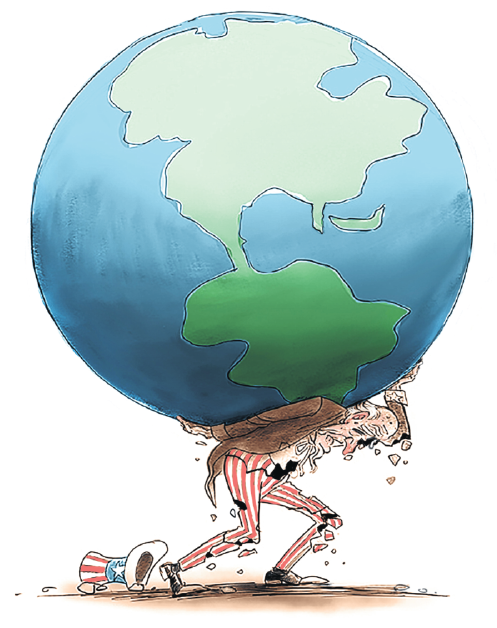Diminishing returns


Does the US withdrawal from Afghanistan signal decline of its hegemony?
As a hegemon, not only does the United States need to maintain its status as the topmost power in the world, it also needs to demonstrate four basic capabilities-being able to steer and maneuverer the global situation in its favor, to remain credible in international affairs, especially among allies and partners, to maintain effective in execution, and to demonstrate the soft power of leading by example. The debacle in Afghanistan has demonstrated to the world that these capabilities of the US hegemon are diminishing.
To begin with, the war in Afghanistan was not merely a war against terror. Essentially, the US war in Afghanistan was to demonstrate that, in the wake of the unprecedented terrorist attacks, the US hegemon was capable of reshaping the world the way it desires. However, after 20 years of fighting against Taliban forces that enjoyed little moral support in the world and was based in a remote and backward country, the most powerful war machine in the world has failed in its mission. Afghanistan is back to square one, or even worse.
The hasty withdrawal of US forces from Kabul has inevitably evoked the memory of "the Saigon moment" in Vietnam in 1975. But the two withdrawals are fundamentally different in terms of the global situation now and then. Although hasty, the decision to pull the US troops from Saigon came after the collapse of the US-backed South Vietnamese regime, and the decision to withdraw from Vietnam was made in 1973 after Richard Nixon's visit to China. It is true that "the Saigon moment" appeared humiliating for the US, but the establishment of the US-China-USSR strategic triangle that was in America's favor laid the foundation for the US to prevail in the Cold War.
The US withdrawal from Afghanistan, by contrast, has little positive impact on the world situation the US faces today. Moreover, it has left a mess for all the countries and regions involved in Afghan affairs, including China, Russia, India, Iran, Pakistan, Saudi Arabia and the entire South and Central Asia. Even Europe is deeply worried. After all, terrorist attacks by religious extremists and displaced refugees have been a lingering nightmare for Europeans throughout these years.
Second, the debacle in Afghanistan has done enormous damage to the credibility and prestige of the US, especially the trust and confidence of its allies. When the Joe Biden administration came to power, he claimed that "America is back", and he vowed to reinvigorate the US alliances and thus reestablish US leadership. President Biden and his top officials have shuttled among the Indo-Pacific and European countries one after another, assuring the US allies and partners that the US will honor and deliver on its commitments and obligations to their security and development on the condition of their support. However, in his public speech right after the Taliban took over Kabul, President Biden repeatedly stressed that the US and its military "serve only the American interests", and that the collapse of the Afghan government and its forces were the result of "Afghans' inability to fight for themselves".These words imply unmistakably that the US has little commitment and obligation to those Afghans who have worked for the US in the past two decades, hence the Afghan government that the US helped to build deserved to collapse because it was incapable of "defending itself". This is a devastating blow to the credibility of the US, making its commitments and obligations to its allies and partners questionable and even untrustworthy.
Third, the debacle has exposed the poor execution capabilities of the Biden administration. Some pundits have blamed "an intelligence failure" for the disastrous ending of the US withdrawal from Afghanistan.
Indeed, just a few weeks ago when the hasty withdrawal started, President Biden and his team asserted repeatedly that "the Afghan government would not fall", and they were confident that "the 300,000-man strong government troops, trained and equipped by the US, were fully capable of pushing back the Taliban". However, that proved not to be the case. Modern management theory proves that in the absence of a robust and effective arrangements for policy coordination, all pieces of information and intelligence, no matter how true they may be, are just a bunch of "unrelated words" that bear little value for decision-making. The ineffectiveness or even lack of coordination in policy implementation inevitably leads to poor and chaotic execution. Thus, when it became obvious that the Taliban forces were overrunning the country and a major defeat was in sight, the US representatives were still negotiating with the Taliban in Doha. Only when the debacle became a fait accompli did the Biden administration hastily reinforce the US forces. Over 7,000 US troops crowded into Kabul airport, just to ensure that "no American life would be lost" in Afghanistan. But the disaster is done already.
Last but not the least, the US has been proud of its soft power, which it regards "a substantial strength "that helped the US to prevail in the Cold War. In his inaugural speech, President Biden vowed the US must lead by "power of example". However, the Afghan government backed by the US collapsed even before the US had pulled out completely. And few of the Afghans the US forces "liberated" from the Taliban's rule have stood up to defend the "democratic" government the US had spent billions of dollars to establish for them.
Some pundits have argued that the US withdrawal from Afghanistan will enable the US to focus on the competition with China. However, the linchpin of the Biden administration's strategy to "outcompete China" is to create a coalition of allies and partners with shared values vis-à-vis China. This demands not only strong US leadership, but also the hegemonic power based on its capabilities of keeping the global situation under control, remaining credible and trustworthy among its allies and partners, being effective in execution, and possessing soft power of leading by example. The debacle in Afghanistan has shown to the world that the US nowadays possesses little of the above discussed capabilities. As such, it is doubtful whether the US can establish and maintain a coalition of allies and partners as desired by the Biden administration in order to outcompete China.
The author is a university professor and dean (academic affairs) of the Institute of International and Regional Studies at Beijing Language and Culture University. The author contributed this article to China Watch, a think tank powered by China Daily.
The views do not necessarily reflect those of China Daily.
































